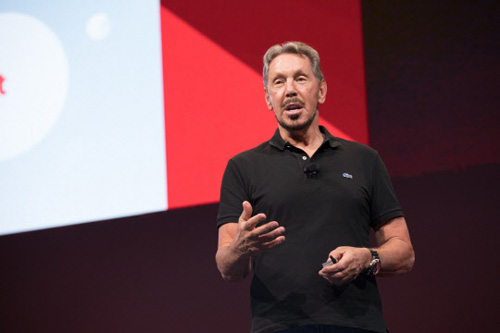Oracle, ‘challenge’ in cloud eco system division by ``18c’
Lee Gyung Tak | kt87@ | 2017-10-11 10:41:02

Larry Allison, chairman of Oracle, is explaining the autonomic operations database
Oracle has been focusing on whether it will be able to achieve a ‘cloud-based’ system which separates Amazon and the cloud ecosystem through an autonomous operations database management system (DBMS) `18c`.
Amazon Web Services (AWS) ranked first for two consecutive years, accounting for more than 40 % of the global service infrastructure (IaaS) public cloud market last year, according to market researcher Gartner. Microsoft, Microsoft, Alibaba, Google, and Oracle are classified as giants and have not entered the major ranking.
In the public IaaS market, which is the most basic stage of the cloud, AWS is becoming more and more influential, and it is not easy for Oracle to form a competitive landscape. In this environment, Oracle`s chosen strategy is to compete with AWS for the biggest strength of the company, the DBMS solution.
"As companies move their core systems more and more into the cloud environment, Oracle is expanding its presence around PaaS (service-oriented platforms) in the enterprise cloud market," an Oracle representative in Korea said. In fact, the company`s first quarter cloud business revenue totaled 1.672 trillion won, up 51.4 percent from the previous quarter.
DBMS is a solution that classifies and manages data, and it is considered to be the most important factor together with operating system (OS) in enterprise IT system. For example, in a banking system, it is the DBMS that guarantees the consistency of this number when a customer views a bank account. Especially, in the big data era, data is the key to competitiveness of enterprises, and the importance of efficient DBMS construction is increasing.
"As enterprise IT systems move to the cloud, Oracle`s competitors such as AWS offer cloud-based DBMS services such as RedShift, Dynamo DB, and Aurora, and are taking over Oracle, the former leader," stated Oracle. "We have transformed all our solutions across the enterprise into cloud form and are strengthening our influence in the DaaS (service-oriented DB) and PaaS markets, but we needed a number of spies to stop this."
Oracle today unveiled a new DBMS `18c` that uses machine learning at Oracle OpenWorld, an annual event held at the Moscone Center in San Francisco, California, from October 1 to 5. The solution is expected to be released in December with the ability to self-tune and patch DB `queries (request for information gathering)` without human intervention based on autonomy and automation. When security vulnerabilities are found, real-time patching enhances security.
According to Oracle, the 18c guarantees "downtime" of less than 30 minutes a year with 99.995% reliability and availability. The machine learning function distinguishes abnormal log data from a large number of data sets, integrates them, learns patterns, and constantly learns. Especially, it eliminates the need for a DBA (database administrator) to reduce labor costs.
"I thought it would take a decade if it could not be done to automate and automate the DBMS area, but it is faster than I thought," said a DBA. "It seems that it is getting harder to avoid the changes brought about by cloud and artificial intelligence across the IT industry."
At the event, Larry Ellison, chairman of Oracle, stated, "18c can run the computing process more flexibly through automation, but AWS`s DBMS does not, and it costs customers unnecessary costs and performance." We will provide at least 50% less than DBMS RedShift in a cloud environment. "
It was declared war against AWS, a strong player in the cloud market.
Meanwhile, Oracle plans to significantly enhance IaaS performance by providing 25Gbps performance Ethernet (local area network) for the first time among cloud service providers, and apply block-chain technology to all solutions as well as machine learning
By Lee Gyung Tak kt87@
